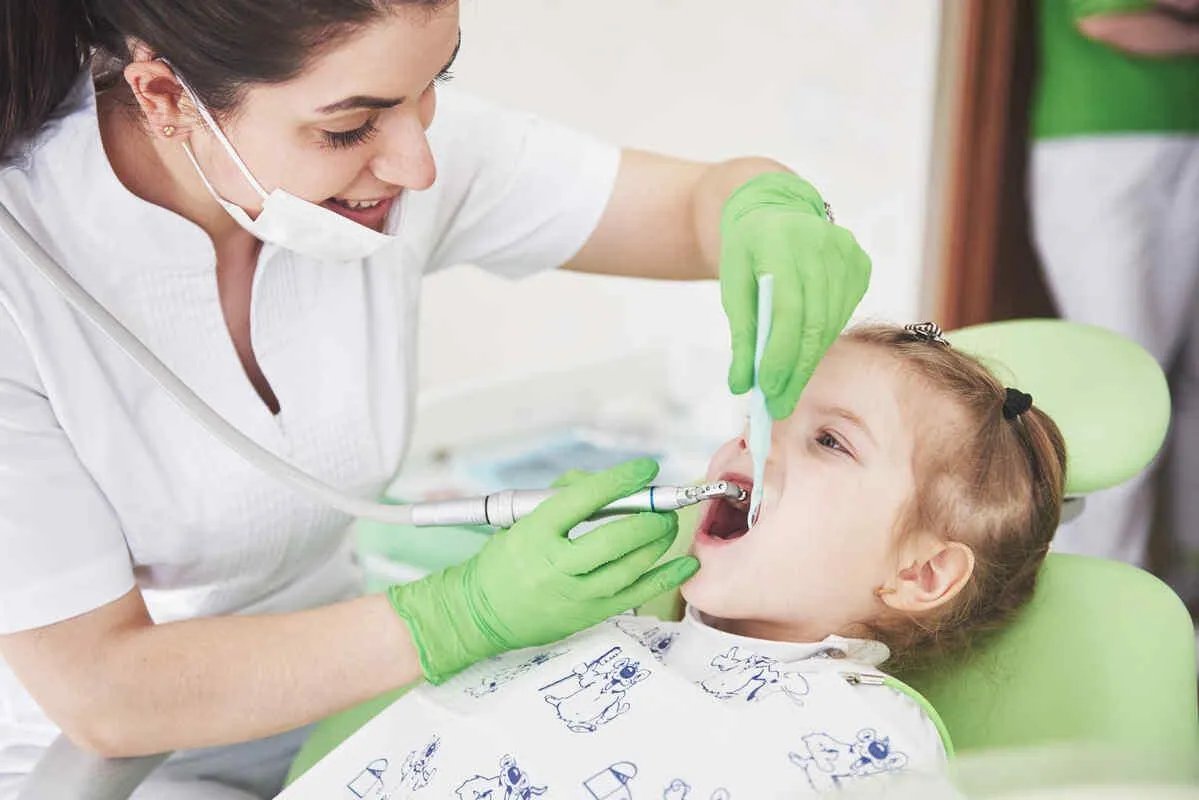Read All About It
Dental Related Articles


The Role of Pediatric Dental Cleaning in Your Child’s Oral Health
The well-being of your child's oral health is of paramount importance. Ensuring your children develop good dental habits from an early age can set the foundation for a lifetime of healthy smiles. In this article, we will explore the significance of pediatric dental cleaning, how it differs from regular dental cleaning, and why it is crucial for your child's overall health. We'll also discuss what to look for in a pediatric dentist and share tips on promoting good dental habits in children.
What is Pediatric Dental Cleaning?
Pediatric dental cleaning, often referred to as children's dental cleaning, is a professional dental procedure designed to maintain and improve the oral health of children. This process involves removing plaque and tartar from teeth, polishing the enamel, and sometimes applying fluoride treatments to prevent tooth decay. While similar to adult dental cleanings, pediatric dental cleanings are tailored specifically to meet the needs of young patients.
The Importance of Pediatric Dental Cleaning
Pediatric dental cleaning is essential for a couple of very good reasons.
First, it helps prevent cavities and tooth decay, which are common issues among children. Regular cleanings remove the buildup of plaque and tartar that can lead to these problems.
Second, professional cleanings allow for early detection of potential issues, enabling timely intervention and preventing further complications.
For example, consider a young boy named Alex. During a routine pediatric dental cleaning, his dentist noticed the early signs of a cavity forming on one of his molars. Because it was caught early, a simple filling was sufficient to address the problem. If Alex had not had his teeth cleaned and examined regularly, this cavity could have worsened, leading to more extensive and costly treatments down the line.
Why is a Pediatric Dental Cleaning Different from a Regular Cleaning?
While the overall goal of removing plaque and tartar is the same for both children and adults, pediatric dental cleanings are specifically tailored for young smiles. Here's what sets them apart:
Gentle and Fun Environment: Pediatric dental offices are designed to make children feel comfortable. Bright colors, playful decorations, and sometimes even toys create a welcoming atmosphere that can ease any anxiety your child might have.
Specialized Techniques: Pediatric dentists use kid-sized tools and techniques to ensure a gentle yet thorough cleaning.
Focus on Education: During the cleaning, the dentist will explain what they're doing and why it's important. They'll also offer age-appropriate oral hygiene tips to empower your child to take charge of their smile.

Early Detection and Prevention
Early detection of dental issues is a significant advantage of regular pediatric dental cleanings. Identifying problems like cavities, misaligned teeth, or gum disease early on allows for prompt treatment, which can prevent more serious complications later. Early intervention is often simpler and less invasive, making it easier on both the child and the parents.
For example, young Emma had slightly crooked teeth that were spotted during a routine checkup. Because her dentist caught this early, Emma was referred to an orthodontist who provided a simple, effective treatment plan. Without early detection, Emma might have needed more extensive orthodontic work in the future.
The Long-term Benefits of Good Oral Health
Good oral health in childhood can lead to numerous long-term benefits. Oral hygiene contributes to overall well-being, enabling children to eat, speak, and smile confidently.
Establishing good oral hygiene habits early can reduce the risk of dental problems in adulthood.
Beyond the Smile: The Lifelong Benefits of Good Oral Health
Healthy teeth aren't just about a pretty smile. They play a crucial role in your child's overall well-being. Here are some ways good oral health benefits children:
Improved Nutrition: When teeth are healthy and pain-free, children can chew efficiently, allowing them to enjoy a wider variety of nutritious foods. This ensures they get the essential nutrients they need to grow and develop.
Enhanced Self-Confidence: A healthy smile can boost a child's confidence. They'll feel more comfortable smiling and interacting with others without feeling self-conscious about their teeth.
Reduced Absenteeism: Oral health problems can lead to pain and discomfort, causing children to miss school. Regular dental cleanings help prevent these issues and ensure your child can attend school regularly.

Good Dental Habits for Children
Promoting good dental habits from an early age can prevent future oral health issues. Here are some tips to help your child maintain a healthy smile:
Regular Brushing and Flossing: Encourage your child to brush twice a day with fluoride toothpaste and to floss daily.
Healthy Diet: Limit sugary snacks and drinks, and promote a balanced diet rich in fruits, vegetables, and dairy products.
Routine Dental Visits: Schedule regular dental checkups and cleanings every six months to monitor and maintain your child's oral health.
Fluoride Treatments and Sealants: Discuss with your dentist the benefits of fluoride treatments and dental sealants to protect your child's teeth from decay.
By fostering these habits, you can help your child enjoy a lifetime of good oral health.
Preventing Tooth Decay and Cavities: The Importance of Regular Checkups
Think of tooth decay and cavities as uninvited guests in your child's mouth. Regular dental checkups, including cleanings, are like security checks that keep these unwanted visitors at bay.
Here's how these checkups help:
Professional Cleanings
Thorough Removal of Plaque and Tartar: Pediatric dental checkups typically include professional cleanings that remove plaque and tartar buildup on your child's teeth. Plaque, a sticky film of bacteria, forms on teeth and can harden into tartar if not removed. Both plaque and tartar are breeding grounds for cavity-causing bacteria, which can lead to tooth decay and gum disease if left unchecked. By having regular cleanings, you help ensure your child's teeth remain healthy and free from harmful buildup.
Polishing for a Bright Smile: In addition to cleaning, the dentist may polish your child's teeth to remove surface stains and give them a brighter appearance. This not only enhances your child's smile but also promotes a positive attitude towards dental visits and good oral hygiene.
Early Detection
Identifying Cavities Early: One of the most significant benefits of regular dental checkups is the ability to detect cavities in their earliest stages. During these visits, dentists can use specialized tools and technology, such as X-rays, to identify potential problems before they escalate. Early detection means that issues can be addressed with less invasive treatments, such as simple fillings rather than more complex procedures like root canals or crowns.
Monitoring Developmental Changes: Regular checkups also allow dentists to monitor your child's dental development, including the growth of permanent teeth and the alignment of their bite. This ongoing assessment helps ensure that any potential issues, such as misalignment or overcrowding, are identified and treated promptly.
Personalized Advice
Tailored Oral Hygiene Recommendations: After evaluating your child's oral health, the dentist can provide personalized recommendations on effective brushing techniques and flossing habits. For example, they may suggest using a specific type of toothbrush or toothpaste that suits your child's needs, as well as demonstrate the proper way to brush and floss to maximize plaque removal.
Dietary Modifications: Dentists can also offer advice on dietary modifications to help prevent cavities. They may discuss the importance of limiting sugary snacks and beverages, encouraging a balanced diet rich in fruits, vegetables, and dairy products. Additionally, they might suggest foods that promote dental health, such as crunchy vegetables that help clean teeth naturally.
Creating a Custom Oral Care Plan: Based on your child's unique dental health and dietary habits, the dentist can develop a custom oral care plan that includes specific recommendations for at-home care. This personalized approach empowers parents and children to take proactive steps toward maintaining excellent oral health and minimizing the risk of dental issues.
By incorporating professional cleanings, early detection, and personalized advice into pediatric dental checkups, you can significantly enhance your child's oral health. Regular visits foster a positive relationship with dental care, equipping children with the knowledge and skills they need for a lifetime of healthy smiles.
Remember, prevention is always better than cure. Regular dental checkups with cleanings are an investment in your child's lifelong oral health.

Choosing the Right Pediatric Dentist
Selecting the right pediatric dentist is crucial for your child's oral health. Look for a dentist who has specialized training in pediatric dentistry and experience working with children. The dental office should be child-friendly, with a welcoming environment and staff who are skilled at managing young patients.
When evaluating potential pediatric dentists, several key factors can help you choose the right professional for your child's dental needs:
1. Qualifications and Experience
Board Certification: Ensure that the dentist is board-certified in pediatric dentistry, which indicates they have completed the necessary training and education to specialize in treating children. This certification demonstrates a commitment to high standards of care and ongoing education in the field.
Experience with Children: Look for a dentist who has significant experience working specifically with children. An experienced pediatric dentist will be familiar with common dental issues that affect children and will be adept at performing treatments tailored to young patients.
Positive Reviews and Recommendations: Research online reviews and ask for recommendations from friends, family, or your child's pediatrician. Hearing about other parents' experiences can provide valuable insights into the dentist's expertise and approach to care.
2. Office Environment
Child-Friendly Atmosphere: A welcoming, child-friendly office is essential for creating a positive dental experience. Look for offices with bright colors, playful decorations, and themes that appeal to children, making the environment less intimidating.
Engaging Activities: Many pediatric dental offices include activities such as play areas, books, or interactive games in their waiting rooms. These features can help ease your child's anxiety and make the visit more enjoyable.
Cleanliness and Safety: Observe the office for cleanliness and safety measures. A well-maintained and hygienic environment is crucial for preventing infections and ensuring your child's comfort.
3. Approach to Care
Patient and Gentle Demeanor: The pediatric dentist should exhibit a patient and gentle demeanor, as children can be apprehensive about dental visits. A calm approach can help alleviate fears and foster trust between the dentist and your child.
Skill in Managing Anxiety: Look for a dentist who is skilled in handling children's fears and anxieties. They should use positive reinforcement, distraction techniques, and effective communication to help children feel more comfortable during their appointments.
Educational Focus: A good pediatric dentist will take the time to explain procedures and the importance of dental care in a way that is age-appropriate. This educational focus empowers children to take charge of their oral health and instills good habits from a young age.
Considering these factors when evaluating potential pediatric dentists, you can ensure that your child receives the best possible dental care in a supportive and friendly environment. Choosing a dentist who meets these criteria will help create a positive dental experience that promotes a lifetime of good oral health.
Bottom Line
Pediatric dental cleaning or children's teeth cleaning is crucial for maintaining your child's oral health and establishing good dental habits early on. This specialized procedure involves removing plaque and tartar, polishing teeth, and potentially applying fluoride treatments to prevent decay. Unlike adult cleanings, pediatric dental cleanings cater to the unique needs of children, creating a fun and comfortable environment with kid-sized tools and an emphasis on education.
Regular pediatric dental cleanings help prevent cavities, detect issues early, and contribute to overall well-being by improving nutrition, boosting self-confidence, and reducing school absenteeism. To promote good dental habits, encourage regular brushing and flossing, a balanced diet, routine dental visits, and discuss fluoride treatments and sealants with your dentist.
Choosing a qualified pediatric dentist is essential, as they should have specialized training and create a welcoming environment for children. Ultimately, pediatric dental cleaning fosters a lifetime of good oral health and confident smiles. For inquiries about pediatric dental cleaning, contact Hurst Pediatric Dentistry at (205) 969-7454.

19 INVERNESS CENTER PARKWAY, STE 250, BIRMINGHAM, AL 35242
TEL: 205.969.7454
E-MAIL: [email protected]
2018 © ALL RIGHTS RESERVED | PRIVACY POLICY | TERMS AND CONDITIONS
Site by Trustway Marketing Powered by Kyrios Systems